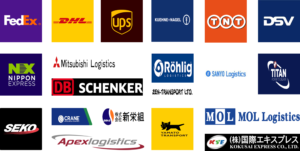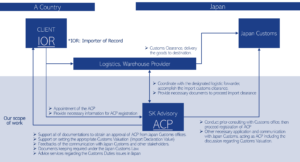Customs Valuation System
Introduction
The customs value of imported goods, which is the basis for the calculation of customs duties and import consumption taxes, is the most important thing that always arises at the time of import customs clearance and customs audit (post-clearance audit - PSA). By properly understanding the structure of laws and regulations pertaining to the method of determining the customs valuation, it enables to avoid paying excessive customs duties and consumption taxes or under-declaring them. Appropriate management of customs valuation is a significantly essential initiative from the perspective of both import costs and compliance management.
Customs Valuation System
When Customs Duties are imposed on imported goods, it has to determine the tax base for value-based duty items, which is called "Customs Valuation". The international agreement that establishes the customs valuation system is the WTO Customs Valuation Agreement (the Agreement on lmplementation of Article VII Of the General Agreement On Tariffs and Trade 1994). Japanese "Customs Tariff Law" is stipulated in accordance with the said agreement.
WTO Customs Valuation Agreement
WTO Customs Valuation Agreement sets forth the following three basic factors for determining the customs value, which is also the premise of the Japanese customs valuation system.
- The value for customs purposes of imported merchandise should be based on the actual value of the imported merchandise
- The merchandise is sold or offered for sale in the ordinary course of trade under fully competitive conditions.
- When the actual value is not ascertainable, the value for customs purposes should be based on the nearest ascertainable equivalent of such value.
A comparison of the structure of WTO Customs Valuation Agreement and Japanese Customs Tariff Law regarding the determination of customs value is as follows. While the basic structure is equal, partially, each country has its own rules and regulations.
| WTO Customs Valuation Agreement | Customs Tariff Law (Japan) |
| Art.1 Transaction value as primary basis for customs value | Art.4 Principle for determining customs value |
| Art.2 Transaction value of identical goods basis | Art.4-2 Transaction value of identical or similar goods basis |
| Art.3 Transaction value of similar goods basis | |
| Art.4 The right to select a method between Art.5 and 6 | Art.4-3(3) Preference for the method "cost of production" basis at the request of the importer |
| Art.5 Sales price of the imported goods, identical or similar imported goods basis | Art.4-3(1) Domestic selling price basis |
| Art.6 Computed value basis | Art.4-3(2) Cost of production basis |
| Art.7 Using reasonable means consistent with the principles and general provisions of this Agreement and of Article VII of GATT 1994 | Art.4-4 Determination of customs value of special imported goods |
| Art.8 The items shall be added to the price actually paid or payable | Art.4(i~v) The items shall be added to the price actually paid or payable |
| Art.9 Conversion of currency | Art.4-7 Foreign exchange rates used for conversion of currency |
| Art.4-5 Determination of customs value of imported goods, deteriorated or damaged Art.4-6(1) Exception for airfare Art.4-6(2) Exception for personal goods Art.4-8 Materials to be used for calculation of customs value Art.4-9 Delegation to Cabinet Order |
Ref. WTO Customs Valuation Agreement, Customs Tariff Law (Japan)
WCO Technical Committee on Customs Valuation(TCCV)
The WCO Technical Committee on Customs Valuation (TCCV) makes technical decisions and publishes them as instruments in the form of:
These instruments are only referenced documents to achieve uniformity in interpretation and application of the WTO Customs Valuation Agreement and do not have legal effect in each country unless they are incorporated into the respective national laws.
Customs Valuation in Japan
The basis for determining the customs value for Japanese imports is the Customs Tariff Law (in accordance with the WTO Customs Valuation Agreement).
Basically, the import consumption tax and customs duties are imposed when import declaration is made, those are calculated by multiplying the import declaration price by the tariff rate. The determination of the import declaration price should be decided by the importer under him/her responsibility.
The import declaration price (customs value) is determined by the following steps.
※Please note that this article is drafted mainly aiming to make understanding as capturing big picture, therefore it does not describe details regarding Japan Customs Tariff Law.
| Sale transaction exists between importer and exporter | YES → | [1] Primary method |
| NO ↓ | ||
| Already imported goods that meet the identical or similar conditions of the import goods | YES → | [2] Use of the transaction value of identical or similar goods method |
| NO ↓ | ||
| Able to identify the sales price and costs incurred in Japan | YES → | [3] Use of the domestic selling price method |
| NO ↓ | ↕ selectable [3] or [4] | |
| The exporter is a manufacturer and able to provide production cost | YES → | [4] Use of the production cost method |
| NO ↓ | ||
| [5] Other methods | ||
[1] Primary method
(1) Outline
In principle, if the import is made based on the import transaction※1, we can use the primary method.
※1:Import transaction is a transaction in that a buyer in Japan makes a sale transaction with an overseas seller for shipping the goods to Japan, and the goods actually arrive in Japan.
Please bear in mind that the Invoice Value is not always equal to the Customs Value.
This Primary method is to calculate the Customs Value based on the "Value of the Import Transaction".
The definition of "Value of the Import Transaction" is that, when the import transaction of the import goods has made, the price actually paid or payable regarding the import transaction by the buyer to or for the benefit of the seller for the import goods, and adjusted by certain additional costs such as transportation costs, to the extent that such costs have not been included in the price actually paid or payable for the imported goods.
Calculation formula
Customs value = Transaction value = Actually paid or payable※2 + Additional costs※3
※2: The price actually paid or payable is the total payment made or to be made by the buyer to or for the benefit of the seller for the imported goods. It includes a settlement by the buyer whether in whole or in part, of a debt owed by the seller and other indirect
payment for the seller by the buyer. In principle, the price actually paid or payable shall not include the following charges or costs, provided that they are distinguished from the price actually paid or payable for the imported goods:
1) Charges for construction, erection, assembly, maintenance or technical assistance is undertaken after importation of the imported goods;
2) Transportation costs after importation;
3) Duties and taxes imposed on the imported goods in Japan.
However, if the price actually paid or payable will not be able to be grasped by the whole amount including the above costs, then it shall be the total amount including such costs.
※3:For instance, transportation fee and insurance fee (CIF basis), commissions, etc.
(2)Documents need to prepare
In the case of calculating the Customs value based on the transaction value, the calculation of the customs value should be based on invoices and other documents which are able to verify the price actually paid or payable of the imported goods and to be adjusted certain additional costs such as the transportation costs.
The principle determination method cannot be used for certain import cases, for instance, if there is no sales transaction, goods are traded free of charge, etc. In these cases, the following alternative methods are applied for the determination of the Customs Value.
[2] Use of the transaction value of identical or similar goods method
(1)Outline
If you already imported identical or similar goods, the customs value can be determined by using those goods if the conditions raised by the following can meet.
Conditions of being identical goods
- The imported goods should have been exported approximately within one month before or after the export date of the targeting import goods.
- The imported goods should have been produced in the same country as the target import goods.
- The imported goods should have an identical shape, quality and value as the targeting import goods.
Conditions of being similar goods
- Same requirement as previously mentioned 1.2. in identical goods.
- The imported goods have similarities in terms of shape, component and functions. And it should be interchangeable with the targeting import goods.
(2)Documents need to prepare
- The materials to prove the identity and similarity. e.g. specification document, photos.
- The customs clearance documents related to the referenced identical / similar goods, such as invoice, import permissions.
[3] Use of the domestic selling price method
(1)Outline
In case of customs value cannot be determined by the previous methods, the determination method [3] using the domestic selling price or [4] using of the production cost can be applied. Upon request by importer, the priority of between [3] and [4] are selectable.
If we look at the [3] use of the domestic selling price method, the calculation is made as follows.
Customs value = Domestic selling price※4 - (general expenses required for the domestic sales of identical / similar goods, domestic transportation costs, and paid taxes & customs duties etc.)
(2)Documents need to prepare
- The evidence to prove the domestic selling price
- The materials to prove the domestic expenses (Invoice receipt from logistic companies, invoice receipt to confirm the paid taxes & customs duties)
[4] Use of the production cost method
(1)Outline
When the manufacturing cost of the imported goods can be identified, the customs value can be determined by follows.
Customs value = Production cost of the import goods + (general profits and expenses of export sales of identical / similar goods and the transportation costs until arrival at the port in Japan)
(2)Documents need to prepare
- The evidence to prove the manufacturing cost, such as the accounting ledger of the producer
- The materials to prove the profit and expenses added to the production costs, such as invoices
[5] Other methods
(1)Outline
If the methods mentioned previously cannot be used, Other methods will be applied.
Practically, in many cases, we apply this other methods.
The Circular on the Customs Tariff Law, lists the following methods as example.
- Elastic application of the method prescribed in Article 4 of the Customs Tariff Law
- Calculating customs value by flexibly applying the method prescribed in Article 4-2 (identical/similar) of the Customs Tariff Law
- Calculating the customs value by flexibly applying the method prescribed in Article 4-3(1) (Domestic Sales Price) of the Customs Tariff Law
- Other flexible determination methods
Please feel free to contact us if you would like to discuss anything regarding your customs valuation issues.
YouTube Video - Customs Valuation in Japan - How to calculate import declaration value, how much for import taxes
Japan Customs: Customs Valuation System
Japan Customs: Details of Japan Customs Valuation System
FTA/EPA, Customs and International Trade Advisory Services
ACP Service for Importer of Record (IOR)
ACP Service for Exporter of Record (EOR)
Customs Support for Transfer Pricing Adjustments
Why choose us?
- Customs and International Trade Professionals - Our CEO, Mr. Sawada, is a Certified Customs Specialist in Japan. With years of experience providing services in the Trade & Customs field, his leadership at KPMG and the establishment of his own company, SK Advisory, ensures our commitment to excellence and high-quality service.
- Full Adherence to Japanese Customs Law - Our top priority is to maintain full compliance with Japanese Customs Law and safely import / export our clients' goods into / from Japan. We meticulously manage all import compliance aspects, including Japan Importer of Record (IOR) matter, HS code classification and the correct Customs Valuation of goods entering Japan. We support to complete all the necessary shipping documents, such as Invoice, Packing List and BL, on behald of non-resident / foreign Japan IOR.
- Communication in English, Chinese, and Japanese - Our team, with extensive international experience, excels in communication in English, including facilitating English-language meetings, and has earned considerable trust from clients. We also have staff capable of communicating in Chinese, making us equipped to handle Chinese-language support as well. Naturally, as a Japan-based team, we're totally fluent in Japanese, ensuring seamless communication across these three key languages.
- Reputable and Reliable Partner -The growing demand for our Attorney for Customs Procedures (ACP) services is testament to our quality. We proudly serve clients globally, registering over 50 ACP customers annually. Our consistent track record underscores our reliability and credibility. For a detailed list of our clientele, please visit our "Experiences" section. Our unwavering commitment ensures all our clients successfully acquire Japan IOR status and import goods seamlessly into Japan.
- Recognized ACP Service Provider on Amazon SPN SPN (Service Provider Network) - We are a certified ACP service provider within Amazon's Service Provider Network (SPN), listed under the Trade Compliance category. Many international Amazon Sellers have successfully become Japan Importers of Record (IOR) through our ACP services.

Our Customers - Japan IOR / Attorney for Customs Procedures (ACP) Service
All our clients have successfully become Japan Importer of Record (IOR) and imported goods into Japan under our guidance.

Logistics Companies with Collaboration Experience
Here is a list of our partner logistics and forwarding companies with whom we have had successful collaborations. Please note that this list is not exhaustive, as we are open to working with any logistics or forwarding companies. As Attorneys for Customs Procedures (ACP), we represent non-resident clients (IOR) and coordinate with these logistics companies, who manage the transportation of goods to and from Japan.

Japanese Customs System Reform: Clarification of Importer Definitions
Starting October 1, 2023, Japanese Customs has instituted a pivotal reform aimed at addressing the issue of foreign sellers improperly designating third parties (such as forwarders or customs agents) as importers.
This revision necessitates foreign corporations to utilize an Attorney for Customs Procedures (ACP) to assume the role of Importer of Record (IOR) directly in many cases. The practice of merely nominally appointing another entity as the importer is no longer feasible.
Notably, foreign corporations that act as importers themselves, through the engagement of ACP, are eligible for Japan Consumption Tax (JCT) benefits. (link: Consumption Tax Treatment and Benefits of Using ACP).
As a dedicated ACP firm, we ensure compliance with the law to facilitate correct import procedures, allowing you to trust us with your importation requirements confidently. We are eager to engage in further discussions with you.
Revisions Effective October 1, 2023:
Definition of the Importer
- Regarding a cargo imported under import transaction, an importer is equivalent to “a person who imports a cargo” defined in Article 6-1 (1), General Notification of the Customs Act. ..... This means, the Consignee, etc., in the case of imports conducted through normal transactions between an overseas seller and a Japanese buyer
- In the cases other than above, an importer is a person who has a right to disposition of the import cargo at the time of import declaration. If there is another person who acts on the purpose of the import*, that person is also included :
In case of a cargo imported:
- under lease contracts, a person who rents and uses the cargo.
- for consignment sales, a person who sells the cargo in the name of himself/herself (consignee) by accepting the commission.
- for processing or repairing, a person who processes or repairs the cargo.
- for disposal, a person who disposes the cargo.
For additional information, please refer to the following resources:
- Japan Customs: Leaflet(English) Revision of Import Declaration Items and Attorney for Customs Procedure (ACP) System
- English: Announcement from Japan Customs | Mandatory to Use ACP in Many Cases – Attorney for Customs Procedure
Our ACP Service: The Best Solution for the Japan Importer of Record (IOR)
Attorney for Customs Procedures (ACP) is the best solution for addressing the issue of Japan IOR - Importer of Record. Below is an outline of our primary services and a diagram illustrating the operational structure of the ACP service. Upon successful ACP registration, a foreign entity can become the Japan IOR - Importer of Record.
Basic Scope of Services:
- Consultation with the Japan Customs Office for successful ACP registration.
- Liaising with stakeholders, including Logistics Forwarding Companies and the Customs Offices, on behalf of non-resident clients (i.e., non-resident Japan IOR) to ensure the secure importation of goods.
- Assistance in preparing the necessary documentation for import clearance.
- Support of calculation of Customs Value (Customs Valuation Formula), in accordance with appropriate compliance under the Japan Tariff Customs Law.
- Security Export Control (Classification for List Control, Examination for Catch-All Control, Application of the license to Ministry of Economy, Trade and Industry)
- Documents keeping, required under article 95 - Japan Customs Law
- Providing professional trade/customs advice if any issues arise.
**Both import and export activities can benefit from the use of an ACP (Attorney for Customs Procedures). This support is applicable in scenarios where a non-resident acts as the Importer of Record (IOR) for imports and as the Exporter of Record (EOR) for exports.
Three Steps to Initiate Shipments Under the ACP Program: :
- Quotation Review to Contract Conclusion: Upon receiving your contact details, we will promptly provide a quotation for your review.
- Commencing the Registration of ACP (Attorney for Customs Procedure) to Japan Customs: This process is generally completed in about two weeks.
- Initiation of First Shipment, Import/Export

FAQ for ACP (Attorney for Customs Procedures)
What is the role of ACP (SK Advisory)?
- Representation: ACP (SK Advisory) represents the foreign importer and liaises with Japan Customs and the Forwarding Company/Customs Broker.
- Documentation and Compliance: ACP assists in preparing essential import documents (e.g., Invoices) in compliance with Japan Customs Law and formally requests the Customs Broker to proceed with customs clearance.
- Expert Consultation and Troubleshooting: We are a team of legal experts in Customs Laws, providing direct consultations with Japan Customs to ensure compliance and address issues, including troubleshooting unique challenges in non-resident imports.
How long time does it require to get ACP’s registration?
It will take approximately 2 weeks until getting an approval from Japan Customs Office.
The breakdown of the task is as follows.
- Prepare the necessary documentation between us
- Start pre-consultation with Japan Customs Office and proceed initial review
- Submit paper-based set of application documents to Japan Customs Office for final review
What kind of documents to be necessary for ACP application?
Not limited, but for instance - Power of Attorney, Company Registry, The calculation method of Customs Valuation, Catalog of the import goods, business/logistic flow
ACP can handle all kinds of goods?
ACP, is not capable to handle all kinds of goods. If the goods are subject to specific regulations requires importer to be resident in Japan, such goods can not be handled under the ACP. Restricted regulations are, for instance, Act on Pharmaceuticals and Medical Devices, or PSE/PSC.
Which regions in Japan are we covering?
Any region in Japan, we can handle.
What is difference between ACP and IOR?
ACP is not the Importer. ACP enables non-resident entities to become IOR (Importer of Record).




